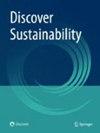Exploration of urban sustainability in India through the lens of sustainable development goals
IF 2.4
Q3 ENVIRONMENTAL SCIENCES
引用次数: 0
Abstract
Abstract The United Nations' (UN) Sustainable Development Goals (SDG) are a recognised metric for measuring environmental, economic, and societal progress. However, national or multinational-level analyses are more prevalent than sub-national types. The performance of 14 SDGs for 56 Indian cities (grouped into 6 regions) with the available 77 indicators (2020–2021) have been analysed. Pearson’s correlation, hierarchical clustering, data envelopment analysis, Theil index, etc. were used to infer existing status, interactions, inequality, efficiency, and interrelationships. Finally, policy suggestions have been offered coupled with limitations to mitigate the drawbacks of the Indian city SDG framework. The findings reveal the asynchronous nature of the SDGs. 18% of Indian cities register a poor track record of converting environmental performance into socioeconomic prosperity, while 55% of cities are lagging in performance compared to their respective states. Significant inequality exists among cities in various regions towards achieving the SDGs. The environment is adversely affected in a race to be economically powerful. So, mainstreaming the environment into development planning is urgently warranted.从可持续发展目标的角度探讨印度的城市可持续性
联合国(UN)可持续发展目标(SDG)是衡量环境、经济和社会进步的公认指标。然而,国家或跨国层面的分析比次国家类型更为普遍。对56个印度城市(分为6个地区)的14个可持续发展目标的表现进行了分析,并提供了77个指标(2020-2021年)。运用Pearson’s correlation、分层聚类、数据包络分析、Theil index等方法推断现有状态、相互作用、不平等、效率和相互关系。最后,提出了政策建议,并结合局限性,以减轻印度城市可持续发展目标框架的缺点。研究结果揭示了可持续发展目标的不同步性质。18%的印度城市在将环境绩效转化为社会经济繁荣方面表现不佳,55%的城市在表现上落后于各自所在的邦。不同地区的城市在实现可持续发展目标方面存在显著不平等。在经济实力的竞争中,环境受到了不利影响。因此,迫切需要将环境问题纳入发展规划的主流。
本文章由计算机程序翻译,如有差异,请以英文原文为准。
求助全文
约1分钟内获得全文
求助全文
来源期刊

Discover Sustainability
sustainability research-
CiteScore
4.00
自引率
7.70%
发文量
38
审稿时长
26 days
期刊介绍:
Discover Sustainability is part of the Discover journal series committed to providing a streamlined submission process, rapid review and publication, and a high level of author service at every stage. It is a multi-disciplinary, open access, community-focussed journal publishing results from across all fields relevant to sustainability research.
We need more integrated approaches to social, environmental and technological systems to address some of the challenges to the sustainability of life on Earth. Discover Sustainability aims to support multi-disciplinary research and policy developments addressing all 17 of the United Nations Sustainable Development Goals (SDGs). The journal is intended to help researchers, policy-makers and the general public understand how we can ensure the well-being of current and future generations within the limits of the natural world by sustaining planetary and human health. It will achieve this by publishing open access research from across all fields relevant to sustainability.
Submissions to Discover Sustainability should seek to challenge existing orthodoxies and practices and contribute to real-world change by taking a multi-disciplinary approach. They should also provide demonstrable solutions to the challenges of sustainability, as well as concrete suggestions for practical implementation, such as how the research can be operationalised and delivered within a wide socio-technical system.
 求助内容:
求助内容: 应助结果提醒方式:
应助结果提醒方式:


